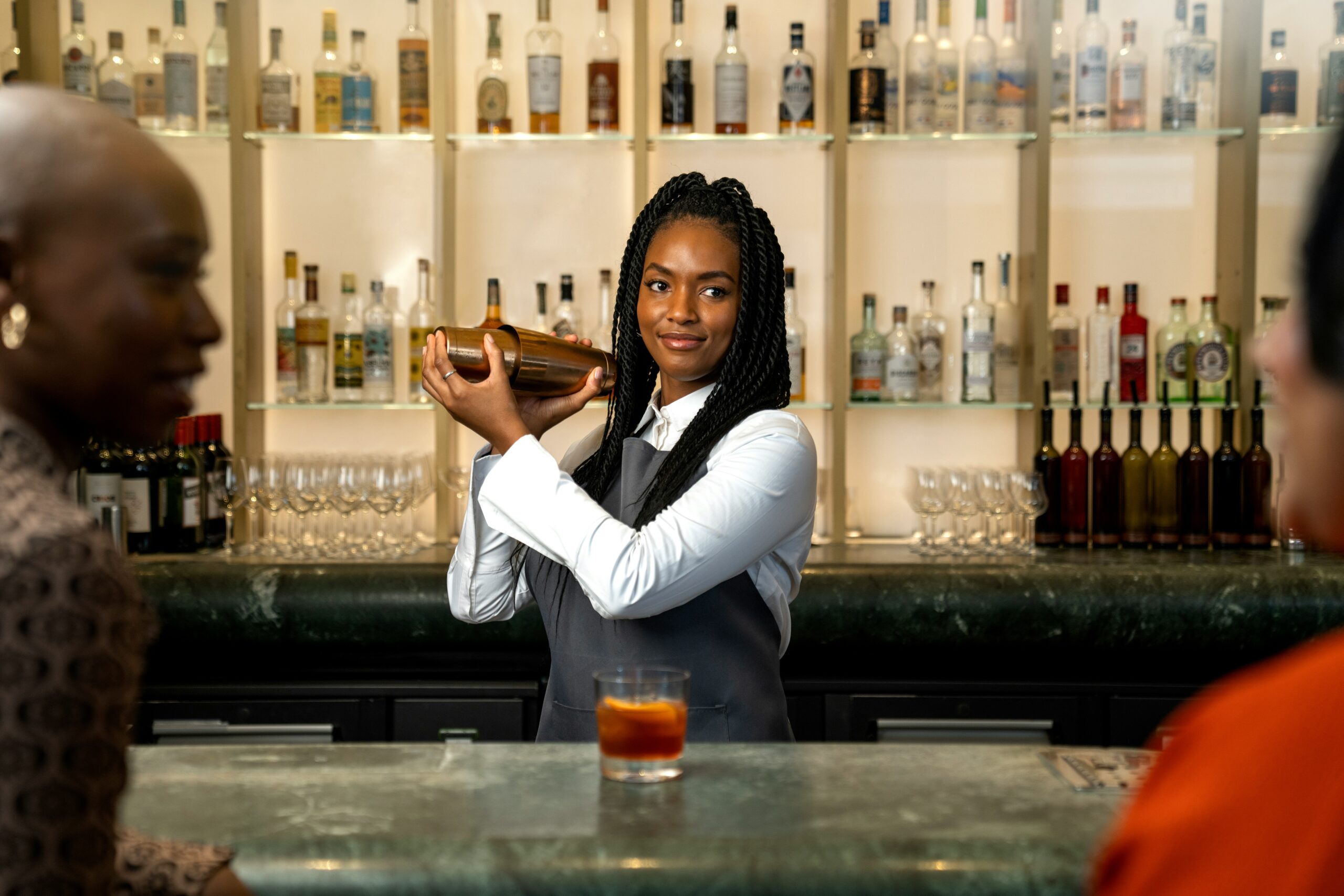For centuries, the American spirits industry, particularly bourbon, has been characterized by legacy, lineage, and a lineage that’s overwhelmingly white and male. In Kentucky, where bourbon was born and aged into its cultural heritage status, the imagery of master distillers and high-end whiskey tastings often exclude faces of color, let alone women of color. But at the intersection of talent, hospitality, and fierce intention, two women, Andrea Meriwether and Angel Teta, are reshaping that narrative from the inside.
21Ninety caught up with Meriwether and Teta at the Angel’s Envy Daycap Pickleball Street Fest in New York City, where the air was light with celebration but the conversation was steeped in purpose.
Opening the Door and Rebuilding the Room
Meriwether began her journey in the industry at just 25, bartending at the prestigious and predominantly white Pendennis Club in Louisville.
“I was the only Black female bartender on the floor at the time, but I met a lot of people, so I learned how to be very open to meeting new people, connecting with people, and just putting myself out there,” she explained.
Instead of resistance, she navigated the space with strategy.
“I didn’t experience a ton of opposition because I lead with talent,” she said. “I lead with my knowledge.”
That mindset shaped the arc of her career and now defines her role at Angel’s Envy, where she doesn’t just represent the brand, she reimagines how it speaks to its audience.
“I’m the queen of a pivot,” she said. “I think fast. I’m very witty. I don’t believe in following trends. I lead in what’s most communal, most authentic, and most striking.”
Angel Teta, Angel’s Envy’s Global Whiskey Guardian, echoes a similar truth from her own path. With over a decade in the industry, she’s well-acquainted with moments of being underestimated, particularly when she stood behind a bar or led a tasting.
“I was training someone new on the job, and people would come to the table and go straight to him,” she recalled. “He’d be like, ‘I actually don’t know — ask her.’ And they’d be like, ‘Oh, she’s the promo model?’ No, she’s actually the expert. She’s our global brand representative.”
While the microaggressions were frequent, the shift in the industry has been palpable for Teta.
“The bourbon space didn’t look like this 10 years ago,” she reflected. “But it’s changed. And that’s partly because we changed the language, the energy, the way we welcome people in.”
Hospitality as Cultural Work
For Meriwether, the work has always been about more than spirits. It’s about shifting how people experience hospitality, especially in a world where prestige and exclusivity often dictate who feels they belong.
“I started out in American whiskey and tourism,” she explained. “Then I fell in love with wine and tried to become a sommelier. But that world had a whole different level of expectation.”
Rather than be deterred, she challenged the elitism at its core.
“I was told: ‘Approach wine the way you would have wanted someone to present it to you.’ Use vernacular. Talk about how it made you feel,” she shared.
That became a north star for Meriwether, creating cultural shifts in how people are invited into the experience.
“I wanted to focus on how I make people feel in those experiences,” she explained. “Because I would go to places and no one ever asked me what I liked or what I was curious about. That’s the change. Meeting people where they are, not speaking over their heads.”
Teta, too, sees the spirits industry not just as commerce, but as a cultural hub, a “third place” where community is built.
“We’re not saving lives, but we are creating something to cheer and to celebrate,” she said. “We’re building hospitality for people in their own homes. That matters.”
Creating Space for the Next Generation
While both women have carved space for themselves, they’re just as invested in creating space for others, especially women coming up behind them.
“Don’t wait,” Meriwether advised. “Start now. We wait for things to be perfect, for the network, the timing, the opportunity. It’s never perfect. That’s where the most growth happens. Be open to feedback. Keep learning. Keep connecting. And don’t create in silence.”
The silence, she warns, is what keeps people isolated. “Hospitality is communal. Talk to your colleagues. Talk to people in other parts of the world. Ask: What are you making? What are you charging? We are the ones who set the standard for our pay equity. We can’t do that if we’re not talking to each other.”
Teta, who has mentored and educated countless bartenders and brand reps across the country, shares that belief in sisterhood and community. “If you work in a silo, you not only get in your own head — you don’t see anything else,” she said. “I want to be challenged, I want to support. I want to take on someone else’s challenge to help them through it.”
And in that spirit, the bond between Teta and Meriwether isn’t just collaborative, it’s transformational.
“We’ve invested in cultivating a relationship of trust and authenticity,” Meriwether said of her work with Teta. “That’s what allows you to go out and really shake things up.”
Teta echoed Meriwhether’s sentiments, emphasizing the need to amplify other women.
“There’s an honesty we can have with each other as fellow women,” she said. “A rising tide lifts all boats, and we’re all about lifting.”
The Future Is Inclusive Because They’re Making It So
It’s clear that the bourbon industry has evolved, not just because it had to, but because women like Teta and Meriwether demanded more, did more, and brought others with them. Their work at Angel’s Envy isn’t just about spirits, it’s about reshaping culture, re-centering community, and proving that excellence has no singular face.
“We’re not outsiders anymore,” Teta said. “We belong here. And we’re making sure others know they do too.”
